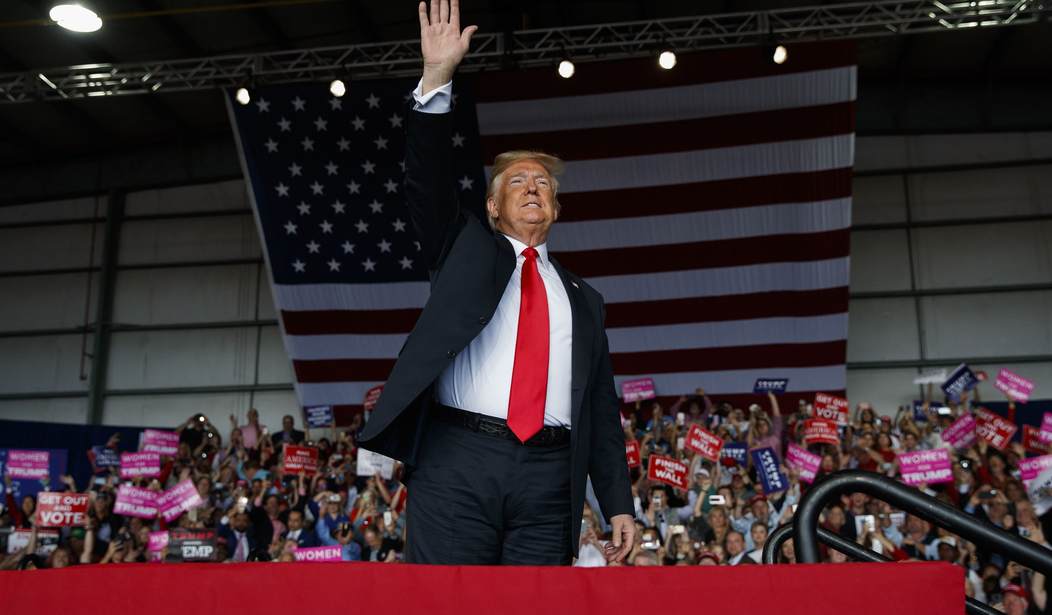The midterms are over, and speculation about the 2020 presidential race has already started. President Donald Trump dominated the Republican primary in 2016, in part by always being on the offensive and providing the cable news channels with hours upon hours of media-perfect events, whether rallies or debates. As a former reality TV star, Trump understands that being an excellent entertainer gives him an advantage over other candidates.
As an incumbent, the coverage he will get will likely be different.
As an outsider, a challenger, Trump's combative and sometimes aggressive tone has provided the edge he needs to ensure he gets lots of coverage.
As president, he has the ability to maintain the warrior positioning, fighting for the American people, and the opportunity to add "happy" to the description -- to become, to embody, a Happy Warrior.
But it's tough to be happy when the journalists covering you are biased, negative and focused on newsy items rather than policy. Call it infotainment. The presidential news conferences have become frustrating to watch and, doubtless, are frustrating for the president to engage in. While we have freedom of the press in our country, we should not tolerate unprofessionalism.
One way to create a more professional environment for news conferences is to put in place clear procedures that spell out what is acceptable behavior and what is not. These would be industry standards that professionals are expected to follow at any news conference.
Possible items include: submitting to being called on one by one; not shouting during news conferences; limiting oneself to one question (if more than one is asked, the spokesperson will choose which question to answer -- and will NOT answer more than one), not asking questions based on rumors or anonymous sources, avoiding infotainment questions (non-policy).
Recommended
That does not mean there is no place for non-policy questions. But they should be asked and answered after news conferences -- by a second person -- in a different location (perhaps the House cloakroom, which is less formal and conveys a this-is-not-a-serious-question backdrop).
Oh, and let's add one more: relinquishing the microphone after a question is asked.
These rules for news conferences and briefings could be posted online by the White House and read aloud by a junior administrative person before each conference.
This would help re-align the focus on policy over infotainment distractions. Additionally, the overall White House communication apparatus could be restructured to more effectively communicate news, combat misinformation and downplay infotainment items.
This would require that strategic communications be handled separately from day-to-day operations and that daily operations be measured against strategic goals, tactics being revised as needed. The administration could create and distribute its own policy updates and coverage directly to the American people through a variety of channels (video, Twitter, Snapchat, Facebook, news releases, short segments, etc). This is already being done today, but could be enhanced.
The impact of any given policy on real American people should be highlighted and showcased. Additionally, areas of potential policy change could be a focus, as could discussion of what the policy change would mean to individual Americans.
A separate group could be set up as a response team to identify inaccurate news stories and push out corrections via several channels, including to key allies and surrogates. This team would focus solely on news items about policy. This should be the heads-down operation -- thinking only of the fire of today, without a strategic viewpoint.
The spokesperson's role could be handled by two people, one responsible for answering policy questions and the second for answering infotainment questions. It would not matter which organization is asking the question. White House Press Secretary Sarah Sanders is great on policy; she is smart and tough, is used to pressure and can give repetitive answers to repetitive questions.
The infotainment spokesperson should be knowledgeable, savvy and well-connected to the administration, a person who can kick policy questions back to the other spokesperson while answering infotainment questions with a smile and with humor. That person will need to be able to joke without appearing snide -- easier said than done when the journalists' questions often have been asked and answered 1,000 times. Think Fred Astaire in movies -- suave, urbane, intellectual and funny. Someone the journalists will like to be around. These questions would include those about speculation and process.
Finally, the White House should encourage reporters from outside Washington to attend the news conferences, and offer them the first and last questions. My guess is that their questions would be more thoughtful and substantive and would reflect the interests and priorities of their home cities and states, which would be a welcome relief from their Washington-focused counterparts based in the capital.

























Join the conversation as a VIP Member